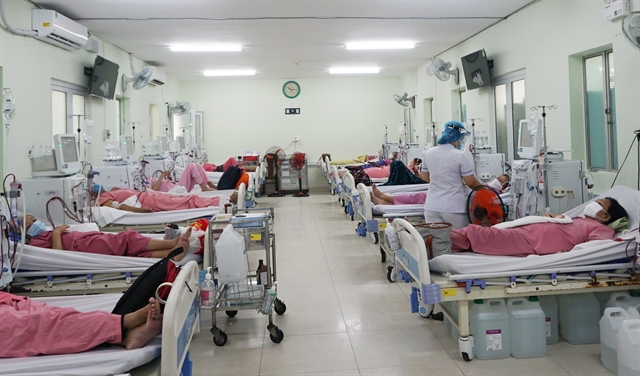 Society
Society

 |
| Patients being treated at Chợ Rẫy Hospital in HCM City. — VNA/VNS Photo Đinh Hằng |
HCM CITY — HCM City’s health sector is implementing various strategies to alleviate the burden on peripheral hospitals.
Despite the efforts of the city’s healthcare sector to reduce the pressure at large hospitals, patients still face hardships when seeking medical care at these facilities.
According to statistics from the city's Department of Health, the city currently has 129 hospitals including 12 central hospitals, 32 city hospitals, 19 district hospitals, and 66 private hospitals.
Among these, 22 hospitals are designated as top-tier facilities for specialised technical expertise and advanced healthcare development in the southern region.
Additionally, 45 hospitals are recognised as continuous training centres.
The city consistently receives a large number of patients from southern provinces and cities seeking medical care.
In the first six months of this year, hospitals in the city received more than 10.67 million patients for consultations and treatment, representing an 11.4 per cent increase compared to the same period in 2023, with total health insurance payments exceeding VNĐ14 trillion (US$550 million).
According to healthcare experts, several reasons are contributing to the overload at hospitals. One of the reasons is that the number of hospital beds has not kept pace with the increasing demand for medical care from citizens.
Local health stations are facing a shortage of healthcare personnel, and inadequate quality of care at lower-level facilities has eroded patient trust.
The health insurance drug classification based on hospital tiers has its shortcomings. Patients with the same condition may receive different medications when treated at hospitals of varying levels.
Many patients take it upon themselves to transfer to higher-tier hospitals in hopes of receiving better-quality drugs and being examined by highly skilled medical teams.
Tăng Chí Thượng, director of the city’s Department of Health, said there has been an increasing influx of patients from provinces and cities seeking medical checkups in the city.
The city has enhanced collaborations with provincial health departments in patient management and improving treatment capabilities at grassroots facilities.
It has also established partnerships with health departments in the Tây Nguyên (Central Highlands) region, the southeast region, and the Cửu Long (Mekong Delta) region, with key activities including medical technique transfer between general and specialised hospitals within HCM City and provincial hospitals.
A network of specialised departments has been developed, prioritising specialties such as obstetrics, pediatrics, neurology, trauma, stroke, cardiovascular diseases, and oncology.
In addition, disease control agencies in localities have signed memoranda of understanding to enhance cooperation and improve epidemic prevention effectiveness.
Local healthcare departments prioritise collaborative efforts to establish a connected application platform and streamline data management for medical practices.
A regional health project is being developed by the city’s Department of Health for submission to the municipal People’s Committee.
This project aims to provide healthcare services for residents in the area.
Under the programme, every six months, localities will review and evaluate their experiences to transform cooperative plans into practical activities to reduce the burden on peripheral hospitals in the city and enhance the quality of healthcare for residents in the region. — VNS




